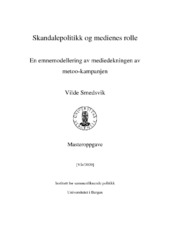| dc.description.abstract | Throughout the past decades, political scandals have been increasingly widespread across the world. The key elements of political scandals are typically sex, money, and power. Today these scandals could not have existed without the media. Scandals have gained increasing status in the political public, and during scandals, the trust in politicians is rigorously tested. The scandals are often directed at individual politicians, where the characteristics of the politician are subject to considerable speculation. The study of political scandals is of importance to students of comparative politics because scandals affect the political system, and as a result of the widespread awareness of scandals, the opportunity is offered to examine what effect they have in society as a whole. The #metoo campaign became a global campaign for women fighting against sexual harassment, confronting several political actors, and the media played a central role. In December 2017, 2143 articles was written on #metoo by the Norwegian press. Whereas the media see it as their social duty to uncover power abuse and other fundamental norm violations, the scholars are claiming that this is contributing to a personification of politics, which is understood as a negative consequence. This thesis applies topic modelling of ten different Norwegian newspapers, examining which aspects of the political scandal the media has been focusing on in their coverage. Scandals affect voters, and readers’ interpretations or perspectives may be modified based on the medias presentation. Thus, the role of media during political scandals is a significant matter. The result indicate that the media had an overwhelmingly large proportion of their focus directed at one political actor, and one may argue that this have contributed to personalization. Whether this is an absolute negative aspect, is up for discussion. Furthermore, the analyses in this thesis accumulate several questions that can not be answered by topic modelling but may be interesting and meaningful for further research. Although many of the results are significant, this thesis also display many of the pitfalls of automatic content analysis methods. | en_US |
